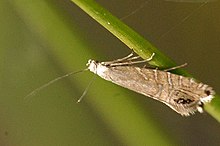| Glyphipterix thrasonella | |
|---|---|

| |

| |
| Scientific classification | |
| Domain: | Eukaryota |
| Kingdom: | Animalia |
| Phylum: | Arthropoda |
| Class: | Insecta |
| Order: | Lepidoptera |
| Family: | Glyphipterigidae |
| Genus: | Glyphipterix |
| Species: | G. thrasonella
|
| Binomial name | |
| Glyphipterix thrasonella (Scopoli, 1763)
| |
| Synonyms | |
| |
Glyphipterix thrasonella is a species of moth of the family Glyphipterigidae. It is found in the western part of the Palaearctic realm.
The wingspan is 11–15 mm.The forewings are shining bronzy, sometimes coppery-tinged; six obscure golden metallic transverse streaks from costa between 1/3 and apex, and one or two from dorsum posteriorly, all sometimes obsolete; a violet -black mark on tornus, enclosing two or three golden metallic dots, and a similar dot above it; sometimes two or three fine black dashes above this; a blackish apical spot; dark line of cilia indented below apex. Hindwings are dark fuscous.[1]
Adults are on wing from May to August.
The larvae probably feed on Juncus species.
- ^ Meyrick, E., 1895 A Handbook of British Lepidoptera MacMillan, London pdf
 This article incorporates text from this source, which is in the public domain. Keys and description
This article incorporates text from this source, which is in the public domain. Keys and description